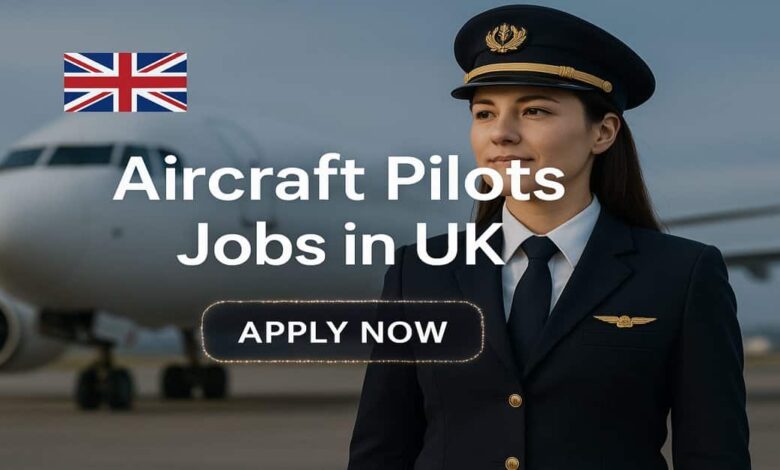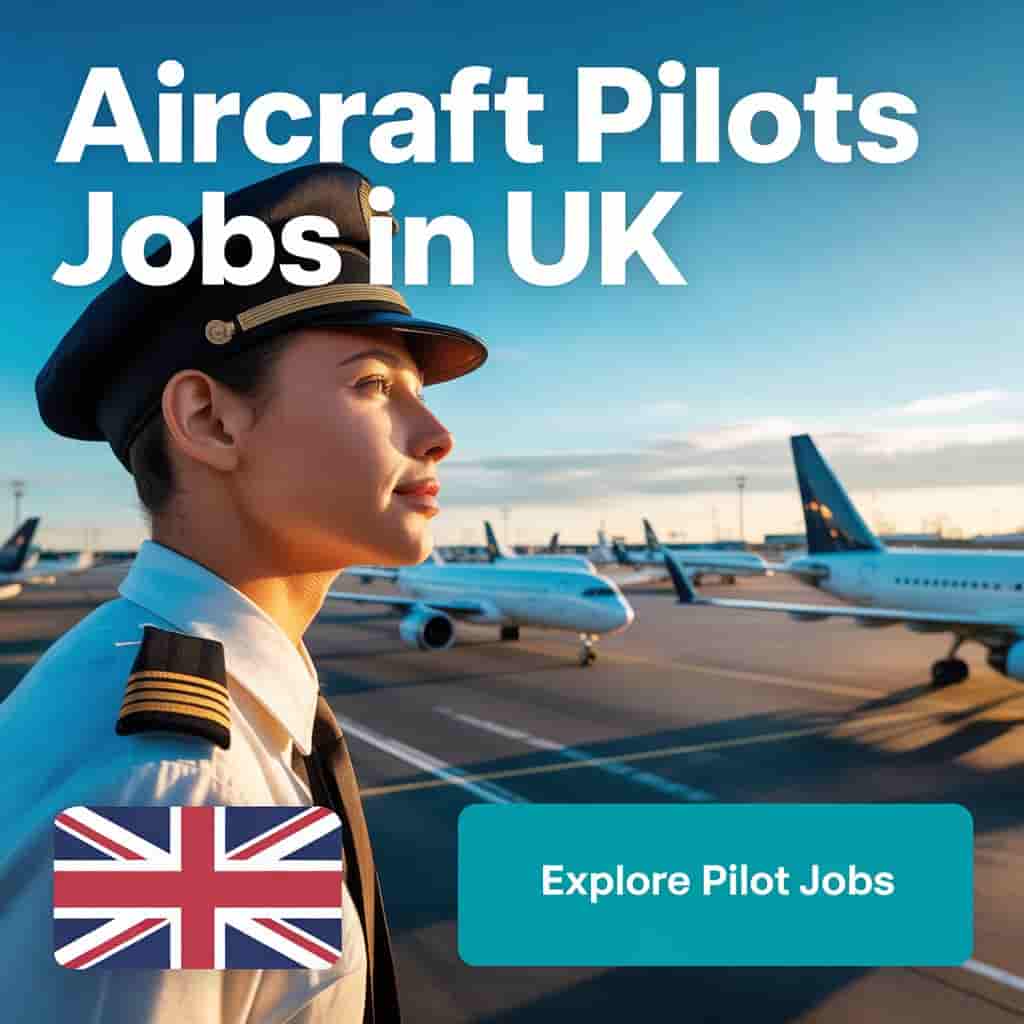Aircraft Pilots Jobs in UK 2026 – Check Here

Imagine soaring through the clouds, commanding the skies over Britain’s stunning landscapes from the rolling hills of the Cotswolds to the bustling hubs of London while securing a career that’s as exhilarating as it is rewarding and offers salaries from £110000 – £160000 annually.
Aircraft Pilots Jobs in UK promise in full-time roles, requiring an Airline Transport Pilot Licence (ATPL) and 1,500+ flight hours, with onsite opportunities at major airports like Heathrow and Gatwick. Whether you’re a seasoned aviator or an aspiring cadet, this guide uncovers the hottest openings, qualifications, and application tips to help you land your wings in the UK’s thriving aviation sector.
Why Pursue Aircraft Pilots Jobs?
The UK’s aviation industry is on an upward trajectory in 2026, fueled by post-pandemic travel booms, sustainable tech innovations, and a push for greener skies. With airlines like British Airways, easyJet, and Wizz Air expanding fleets, pilot shortages are creating unprecedented demand over 1,000 new roles projected this year alone. These jobs aren’t just about flying; they’re about adventure, precision, and impacting global connectivity, all while enjoying competitive pay and work-life balance in a country renowned for its world-class airports and safety standards.
Responsibilities of Aircraft Pilots Jobs in UK:
Aircraft Pilots are the captains of the skies, responsible for the safe operation of commercial, cargo, or private flights. They collaborate with co-pilots and cabin crew to navigate routes, manage emergencies, and ensure passenger comfort. In 2026, roles increasingly focus on eco-friendly practices, like optimizing fuel for lower emissions, blending technical skill with leadership in high-stakes environments.
- Flight Planning: Analyze weather, routes, and fuel needs using advanced software for efficient, safe journeys.
- Aircraft Operation: Command takeoffs, landings, and in-flight maneuvers on aircraft like the Airbus A320 or Boeing 737.
- Safety Protocols: Conduct pre-flight inspections, monitor systems, and respond to emergencies with calm precision.
- Team Coordination: Communicate with air traffic control, crew, and ground staff for seamless operations.
- Passenger Management: Ensure compliance with regulations while prioritizing comfort on long-haul or short routes.
- Record-Keeping: Log flight data, maintenance issues, and incidents for regulatory compliance.
These duties demand razor-sharp focus and adaptability, making every flight a thrilling challenge.
Check Also: Pilots & Aviation Specialist Jobs in Portsmouth
Demand for Aircraft Pilots:
With global travel rebounding and airlines like Ryanair and TUI ramping up routes, the UK faces a pilot shortfall of 500+ annually. Key drivers include:
- Fleet Expansion: New aircraft deliveries require trained pilots for sustainable models.
- Retirement Wave: Veteran pilots retiring creates openings for fresh talent.
- Tech Integration: Demand for pilots skilled in AI-assisted navigation and electric propulsion.
- Diverse Routes: Growth in cargo and regional flights boosts opportunities beyond major carriers.
Salaries reflect this surge: First Officers start at £55,000–£75,000, while Captains command £100,000–£150,000+ at majors like British Airways.
Qualifications and Skills for Aircraft Pilots Jobs in UK:
Becoming a pilot in the UK requires rigorous training, but the payoff is immense. Essential quals include:
- Licensing: Frozen ATPL from the Civil Aviation Authority (CAA), with 1,500+ total flight hours.
- Education: No formal degree needed, but aviation-related courses (e.g., BSc in Aviation Management) help; high school maths/physics is key.
- Medical: Class 1 Medical Certificate from a CAA-approved doctor.
- Experience: 1–2 years minimum for entry roles; modular or integrated training via academies like CAE.
- Skills: Decision-making under pressure, spatial awareness, teamwork, and ICAO English proficiency.
Certifications like Multi-Engine Instrument Rating (MEIR) are must-haves for commercial gigs.

Career Path:
Your ascent to the cockpit follows a structured flight plan:
- Ground School: Pass 13 ATPL theory exams (6–8 months).
- Private Pilot Licence (PPL): 45 hours of flight training for basics.
- Commercial Pilot Licence (CPL): Add instrument and multi-engine ratings (200+ hours).
- ATPL Issuance: Accumulate 1,500 hours via cadet programs (e.g., easyJet’s Generation easyJet) or self-funded modular paths.
- Type Rating: Train on specific aircraft like the A320.
- First Officer to Captain: Gain seniority through line flying.
Benefits of Aircraft Pilots Jobs in UK:
Wings come with perks that elevate your lifestyle:
- High Earning Potential
With salaries ranging from £110,000 to £160,000 annually for Captains, pilots enjoy one of the most lucrative careers in the transport sector, ensuring financial stability and growth. - Global Travel Opportunities
Pilots explore destinations worldwide, experiencing new cultures and cities while getting paid to travel, making the job both adventurous and rewarding. - Work-Life Balance
Many airlines offer flexible rosters with days off between flights, allowing pilots to enjoy quality downtime with family and friends. - Career Progression
From cadet to Captain, the structured career path ensures steady advancement, with opportunities to move into training, management, or long-haul roles. - Visa Sponsorship for Foreigners
Airlines in the UK actively sponsor Skilled Worker Visas, creating openings for international pilots to build careers in a thriving aviation hub. - Prestige and Respect
Being a pilot is regarded as a prestigious profession, combining technical expertise, leadership, and the responsibility of commanding an aircraft. - Job Security
With a projected shortage of over 1,000 pilots annually, qualified aviators benefit from high demand and long-term job stability. - Access to Cutting-Edge Technology
Pilots in the UK fly the latest aircraft like the Airbus A320 and Boeing 787, using advanced navigation and eco-efficient systems that keep the role exciting and future-focused.
Many roles include hybrid scheduling, with time off between flights for balance.
Visa Sponsorship:
Foreign talent is vital to the UK’s aviation recovery. The Skilled Worker Visa sponsors pilots with a job offer, requiring RQF Level 6 skills and £38,700 minimum salary (or occupation-specific rate). Airlines like Wizz Air provide Certificates of Sponsorship (CoS). Apply via GOV.UK within 3 months of your offer eligibility includes English proficiency and no criminal record.
How to Apply for Aircraft Pilots Jobs in UK?
Ready for takeoff? Here’s your checklist:
- Assess Eligibility: Verify ATPL and medical status via CAA.
- Tailor Your CV: Highlight flight hours, ratings, and safety records.
- Network: Join BALPA or attend events like Farnborough Airshow.
- Search Portals: Use Indeed, Glassdoor, or airline sites (e.g., careers.ba.com).
- Apply Directly: Submit for cadet programs or direct-entry Captain roles deadlines for 2026 intakes close soon.
- Prepare for Assessments: Expect sim tests, interviews, and psychometrics.
For internationals, confirm sponsorship during applications. Check Here on sites like Prospects.ac.uk or RAF Recruitment for openings.
Challenges for Aircraft Pilots:
The skies aren’t always smooth:
- High Training Costs: £100k+ investment, though sponsorships help.
- Irregular Schedules: Jet lag and night flights demand resilience.
- Regulatory Shifts: visa updates raise salary thresholds.
- Competition: Cadet spots fill fast; build hours via instructing.
Yet, the thrill and stability make it worthwhile.
UK Airports and Cities for Pilot Jobs:
- London Heathrow (LHR): Global gateway, 80M+ passengers; hub for BA and Virgin.
- London Gatwick (LGW): Second-busiest, ideal for easyJet short-hauls.
- Manchester (MAN): Northern powerhouse for regional and international flights.
- Birmingham (BHX): Growing cargo and passenger ops.
- Edinburgh (EDI): Scenic routes with Loganair and Ryanair.
These hubs offer the most vacancies, with London leading at 40% of roles.
Conclusion:
Aircraft Pilots Jobs in the UK are your ticket to an adrenaline-fueled career, with salaries up to £110000 – £160000 and openings at Heathrow, Gatwick, and beyond. Whether through cadet schemes or direct entry, now’s the time to apply secure your ATPL, check sponsorship options, and soar into aviation’s future. Check Here today on official portals and launch your journey to the skies!
Frequently Asked Questions:
-
Can I become a pilot without a university degree?
Yes. A degree isn’t mandatory, but you must have strong skills in maths and physics and complete approved flight training. Aviation-related degrees can give you an edge but aren’t required.
-
How long does it take to become a commercial pilot in the UK?
On average, it takes 2–4 years. Integrated programs are faster but more expensive, while modular routes allow flexible, step-by-step training.
-
Do airlines in the UK sponsor visas for foreign pilots?
Yes. Many carriers, including Wizz Air and British Airways, sponsor Skilled Worker Visas for qualified pilots. The July update requires a minimum salary of £38,700 (or the occupation-specific rate) for eligibility.



